- Home
- Robin McKinley
Dragon Haven
Dragon Haven Read online
DRAGON HAVEN
ROBIN MCKINLEY
DRAGON HAVEN
G. P. PUTNAM’S SONS
G. P. PUTNAM’S SONS
A division of Penguin Young Readers Group.
Published by The Penguin Group.
Penguin Group (USA) Inc., 375 Hudson Street, New York, NY 10014, U.S.A. Penguin Group (Canada), 90 Eglinton Avenue East, Suite 700, Toronto, Ontario M4P 2Y3, Canada (a division of Pearson Penguin Canada Inc.). Penguin Books Ltd, 80 Strand, London WC2R 0RL, England. Penguin Ireland, 25 St. Stephen’s Green, Dublin 2, Ireland (a division of Penguin Books Ltd.). Penguin Group (Australia), 250 Camberwell Road, Camberwell, Victoria 3124, Australia (a division of Pearson Australia Group Pty Ltd). Penguin Books India Pvt Ltd, 11 Community Centre, Panchsheel Park, New Delhi-110 017, India. Penguin Group (NZ), 67 Apollo Drive, Rosedale, North Shore 0745, Auckland, New Zealand (a division of Pearson New Zealand Ltd). Penguin Books (South Africa) (Pty) Ltd, 24 Sturdee Avenue, Rosebank, Johannesburg 2196, South Africa. Penguin Books Ltd, Registered Offices: 80 Strand, London WC2R 0RL, England.
Copyright © 2007 by Robin McKinley.
All rights reserved. This book, or parts thereof, may not be reproduced in any form without permission in writing from the publisher, G. P. Putnam’s Sons, a division of Penguin Young Readers Group, 345 Hudson Street, New York, NY 10014. G. P. Putnam’s Sons, Reg. U.S. Pat. & Tm. Off. The scanning, uploading and distribution of this book via the Internet or via any other means without the permission of the publisher is illegal and punishable by law. Please purchase only authorized electronic editions, and do not participate in or encourage electronic piracy of copyrighted materials. Your support of the author’s rights is appreciated. The publisher does not have any control over and does not assume any responsibility for author or third-party websites or their content.
Library of Congress Cataloging-in-Publication Data
McKinley, Robin. Dragonhaven / Robin McKinley.
p. cm.
Summary: When Jake Mendoza, who lives in the Smokehill National Park where his father runs the Makepeace Institute of Integrated Dragon Studies, goes on his first solo overnight in the park, he finds an infant dragon whose mother has been killed by a poacher. [1. Dragons—Fiction. 2. Human-animal communication—Fiction. 3. Animals, Mythical—Fiction. 4. Science fiction.] I. Title.
PZ7.M1988Dr 2007 [Fic]—dc22 2007008197
ISBN: 1-4295-6580-2
To Holly, Hazel and Rowan
CONTENTS
CHAPTER ONE
CHAPTER TWO
CHAPTER THREE
CHAPTER FOUR
CHAPTER FIVE
CHAPTER SIX
CHAPTER SEVEN
CHAPTER EIGHT
CHAPTER NINE
CHAPTER TEN
EPILOGUE
CHAPTER ONE
I keep having these conversations with Dad.
I’m at my computer. He says, “What are you doing?” I mutter something, because the screen has a lot of squiggles on it so he already knows what I’m doing.
“Have you started on it yet, Jake?”
“No,” I say, probably more belligerently than I mean to. But we’ve had this conversation so often.
Dad sighs. “Jake, I know I’m nagging you. But it’s important.”
“So is the dictionary important!”
“It’s not important to anyone but you if only you can read it,” says Dad. I glare at him, because he knows that I know that he knows it is important. But that also it’s an excuse.
“I don’t know how to write it,” I mutter. Like, just by the way, I do know how to write my dictionary. Which I don’t either. In spite of the fancy graphics package.
“That doesn’t matter. Just write it.” He tries to make a joke. “Your spelling is pretty good.”
“I don’t know how—I can’t make it a story!” I shout, or rather, I don’t shout, I sort of hiss it through clenched teeth. I want to shout. “It’s not…It doesn’t have…There’s no…” I can’t think how to finish. I can’t think how to begin.
“It doesn’t have to be a story. It doesn’t have to be anything. Just put down what happened. Don’t call it anything.”
Yeah, right. Make pizza without tomato sauce and mozzarella, just don’t call it pizza and you’ll be fine. What’s the use of pizza without tomato sauce and mozzarella? Like Alice said before she saw the White Rabbit: “What is the use of a book without pictures or conversations?” Although the pictures are covered really well elsewhere, and the new coffee-table, drop-it-on-your-foot-and-spend-the-rest-of-your-life-on-crutches art-book version is coming out soon. Text, I have to say, by some chucklehead sensitive type. Yuck. The thought of it is one of the things that’s getting me going here finally. The sensitive version will probably be way too much like a story. A fairy tale.
But who lives a story, you know? With chapters and things. And as a fairy-tale hero if someone gave me a vorpal blade I’d probably stick it in my foot. Or get lost in the mimsy borogroves. Life is just one day after another, even when the days are really, really strange.
Dad looks at me. I look at him. We both know what we’re both thinking. I prod a couple of keys and make the squiggles go squigglier.
“Just do the best you can,” Dad says, really gently. “You’re the only one who can tell it at all.”
Yes. That’s the awful thundering can’t-get-around-it thing. I’m the only one who can tell you about Lois. And the only way I can tell Lois’ story is through me. I feel like starting by saying, I’m not a crazed ego-maniac! Really I’m not! I am a crazed Lois-iac. Joke. Sort of. But it’s not only the freaking hard work of trying to write it all out coherently that is stopping me now. I don’t want to go back there. I’ve got used to…like being able to look out windows again and not worry about what I might see.
Also a lot of the stuff that’s about me is stuff I don’t want to tell anyone. It’s also a lot about Dad and me, and I don’t want to tell those parts either, down on paper and everything, where he can read them. Which he will.
I may not know how to write my dictionary, but at least it’s not embarrassing.
There’s another problem (I should make a list): I don’t remember every day as every day, as different from the day before and the day after. Sure, I kept notes—I kept lots and lots of notes—but I seem to have left a lot of stuff out. All the connecting bits. All the conversations. All the sane bits, if there were any sane bits. I was just trying to stay alive, those days, keep Lois and me alive. And I wasn’t thinking in terms of needing to make a story out of it later on.
And I sure don’t remember every conversation I’ve had in the last four years. I remember a few of them—the ones that really got to me for one reason or another—but mostly, who remembers? Not me. And I bet not you either.
I don’t mean the ordinary, everyday ones you have a lot, like “How are you?” and “What’s for dinner?” (and “I thought it was your turn to cook”). Those are easy. I mean the one-off ones. The ones why you’re trying to write something someone else is going to read at all. So that why-you’re-writing stuff is a lot of stuff you can’t remember well enough to write.
There weren’t many conversations anyway. Not a lot of he-saids and she-saids, or at least not till the end, and then they’re peculiar.
But I’m going to try to tell the truth. Except for the parts I’m leaving out, because there’s still stuff I’m just not going to tell you. Get used to it.
And then, okay, I’ve got this far, I’m not staring out the window, my fingers are on the keyboard, the first finger is wiggling over the first key for the first letter of the first word (whatever that is)…and then I stop all over again, because how do I get your attention? Not your newspaper-headline attention—y
our real attention. How do I tell you the stuff you need to know if you’re going to understand what happened? Because there’s really no point if I’m not trying to make you understand a little.
And, just by the way, who are you?
Dad and Martha say that there are a lot of people—a lot of you (is it going to be easier to think of you as you? Or is that going to weird me out even more?)—who don’t know anything and will only be picking this up because the headlines have made you curious about the whole show and if I want to rave on a little as background that’s probably okay and maybe even a good idea. I guess they figure if they get me raving they’ve won. They’re probably right. So blame them. Although they did say rave a little.
It would be easier to start now and go backwards, but then you’d never understand. I’m going to have to start all those years ago, and I don’t know how to feel like I felt before Lois, or how to get back there to tell the story the way it happened, so maybe you’ll understand. At all. A little.
Mom should be here, reading this, and saying things like, “‘Lois and I,’ dear, not ‘me and Lois.’” And telling me when it’s “whom” and not “who.” But she isn’t. Mom is one of the reasons I don’t want to write any of this. I keep wondering, would it have happened at all—would Lois have happened—if Mom was still here? If I hadn’t been the right kind of nutcase? Was being a nutcase necessary?
Eventually I thought about Eleanor. She never worries about getting anybody’s attention (and that “eventually” would really annoy her), or whether they’re going to be interested, if she wants something. And there are always he-saids and she-saids when Eleanor is around. She-saids, anyway. Eleanor doesn’t have the hugest sense of humor in the world about herself, but I think she’ll get this one. That I’m going to start four and a half years ago, with her shouting at me. Also Eleanor shouting is very rememberable.
“JAKE!”
That’s Eleanor. She has a great future as an alarm system. She’s only seven, but she has precocious lungs.
“JAAAAAKE!”
I threw my window open. “I’m coming! Keep your hair on!”
She glared up at me. “You’re late.”
I looked at my watch. “I won’t be late for another…two minutes.”
“We’ll be late by the time we get there!”
I closed my window, sighed, put my shoes on, and ran downstairs. Our apartment is at one end of the Institute, but nothing is very far from anything else. I flew by a group of tourists gaping at the Draco family charts that stand at the way into the diorama and the tiny movie theater, past the ticket booth and the door to the gift shop and café, waved at Peggy in the ticket booth as she said, “Jake, don’t run,” and was standing beside Eleanor in forty-five seconds. She hadn’t finished glaring yet, and stomped off down the path that led to the zoo, barreling through the thickets of tourists like a cavalry charge. I followed.
Offer to hold Eleanor’s hand? Not if you don’t want it bitten off. Of course there are no highways for her to run across without looking both ways inside the park gates. The only vehicles that come in and out through the gates are our Rangers’ jeeps, which were bought more for endurance than for speed, and from age and the effects of the surfaces they run on, tend to kind of lurch along. Our park tour buses crawl even slower so everyone has a chance to take lots of photos and go “oooh.” They’re solar powered and can’t go any faster. Tourist cars and coaches stay in the parking lot outside. Even the garage for the staff’s private vehicles is outside the gates. (This is not a major issue. If you work here, you probably can’t afford a private vehicle.) And the nearest highway, with like more than two lanes, is fifty miles away, on the far side of Wilsonville.
This was Eleanor’s first week being allowed to help out at the zoo, and she was a little crazed. I was a little crazed, because the grown-ups had decided that Martha was too young to mentor her but I was old enough. I’m not sure the Incredible Hulk is old enough to mentor Eleanor, and Martha is actually pretty good at it. I’m not. It would be okay once we got there, and in another week or two Eleanor should have calmed down a little (I hoped) but meanwhile at 1:55 every afternoon there was a small two-legged elephant trumpeting under my window.
A normal seven-year-old would be happy helping feed baby raccoons at the orphanage. Not Eleanor. Nobody comes to Smokehill for the raccoons, and she wants to be where more of the action is.
I don’t really mind Eleanor though. In some ways she’s restful. She’s too young to remember my mom very well, or Snark. If you think that sounds really sicko, you try being twelve years old when your mother dies and having everyone around you looking at you and thinking of her and feeling sorry for you. It doesn’t help that I look like her. Right after she died—right after we knew she was dead—and people started looking at me like that, I started spending a lot of time in front of the mirror, rubbing my cheeks with my fingers. Well, maybe it was more like scratching my cheeks with my fingers, because I started leaving marks. Dad asked me why. I said I was hoping my beard would come in early. I didn’t say, Because then people won’t look at me like I’m my mother.
Dad was almost the only person who didn’t look at me in that new way, but then he was the only other person who was missing her as much as I was. Dad said, “Oh.” He didn’t ask me why I wanted my beard to come in early. Maybe he guessed. Dad has a beard which he keeps short and tidy so he can make a good impression on the tourists, and the grant administrators. He scratched his own hairy cheeks for a minute and added, “You may not if it does.” I stopped scratching my cheeks. And now it was two and a half years later and my beard still hadn’t started coming in, but people didn’t look at me so much like that any more so I could wait.
Okay, Eleanor and I usually were about a minute late, and Martha was usually there first, lining out the buckets and checking that the labels were all still legible. If anybody got the wrong grub there’d be trouble, from Eric if nothing else. Trouble from Eric is way more than enough however.
“Hiya,” she’d say.
“Huh,” Eleanor’d say, really offhand and casual. “What’ve we got?”
It’s quieter inside the big shed where the food lives—no tourists. That’s another of the big draws for Eleanor, of course, being seen by a lot of grown-ups to be going somewhere they can’t. I no longer cared about that aspect of it (but if nagged I would admit that I remembered when I did) but just getting away from them—the tourists—was always good. It’s a weird life, living at Smokehill, where there’s all that gorgeous, amazing, wonderful empty (I mean human empty) space just behind you, so to speak, but you live in like this tiny permanently besieged encampment where you have to kind of take a deep breath and bolt for it when you go from one cranny of no-tourists to the next.
I don’t particularly want to because it makes me feel more of a mutant than ever but I suppose I should emphasize that life at Smokehill is kind of bizarre. Certainly us kids were always being told (or asked) that wasn’t the way we lived peculiar. Uh, pardon me, but I was born here. So I didn’t like being asked (or told). Other kids were the worst. They said things like, No pizza? Like you might say, No oxygen? Of course we have pizza. But no, we couldn’t call up the local Super Pizza to deliver, that’s true.
Eleanor wouldn’t touch the bugs and beetles, and the bigger live (or soon-to-be-knocked-on-the-head) stuff Eric or Katie would deal with, but she’d put the vegetables and fruit in the buckets after Martha or I cut it up if it needed cutting. (Madagascariensis is such a lazy slob it won’t eat its carrots unless they are chopped up first.) She wasn’t really that much help since we had to keep a sharp eye on her; she felt that fairness meant that everybody got the same thing, but most of the fun food is whatever the Wilsonville and Cheyenne supermarkets feel like sending us of the stuff that’s still around after its sell-by date and, for example, citrus gives russo diarrhea. But Eleanor will get older, and living at Smokehill is weird enough (okay, okay, I admit it) so it’s good if you feel invol
ved. But how many kids get to help out at a zoo? Who needs normal?
Although Martha and I both put our hours in at the orphanage. But then the orphanage is pretty good too. I like little furry baby things, which there aren’t any of at the zoo. Maybe I’m more normal than Eleanor. After the lot at the zoo, something warm and furry or feathery is a nice change too, even if it may throw up all over you. And then there’s warm and furry like a Yukon wolf cub. If Eleanor’s lucky some day she’ll get to hold the broom for it to tear the throat out of while the guy with the sedative gun gets into position.
We’d only just started by the time Katie arrived. Katie makes everyone feel nicer and calmer just by being there, even her daughters. I mean, even Eleanor. Martha is a lot like Katie herself. But after Katie got there Eleanor stopped arguing that since she didn’t like celery nobody else was going to like celery either. (Madagascariensis, I swear, likes celery because the sound it makes slowly crunching it up reminds it of the crack of small bones, without any of the effort of hunting something. You’d think carrots would be even better, but no. Maybe it only hunts things with osteoporosis.)
Then Eric showed up and things went into a decline again—even Katie can’t do much with Eric—but Dad says he’s a good keeper and not everyone wants to live a hundred miles from the nearest real restaurant, work twelve or fourteen hours a day, sometimes seven days a week, and get paid badly, and we’re lucky to have him. That’s Dad’s way of saying “shut up.” It’s a lot better than saying “shut up” but nothing is ever going to make me like Eric.

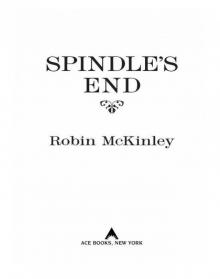 Spindle's End
Spindle's End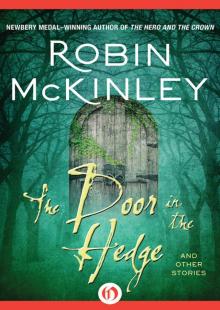 The Door in the Hedge: And Other Stories
The Door in the Hedge: And Other Stories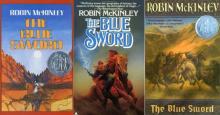 The Blue Sword
The Blue Sword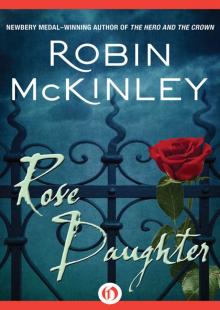 Rose Daughter
Rose Daughter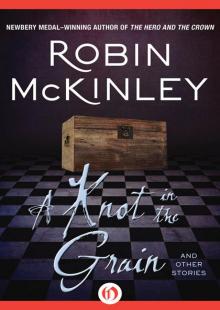 A Knot in the Grain and Other Stories
A Knot in the Grain and Other Stories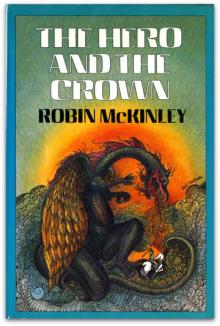 The Hero And The Crown
The Hero And The Crown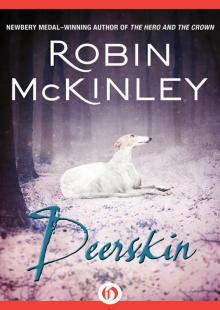 Deerskin
Deerskin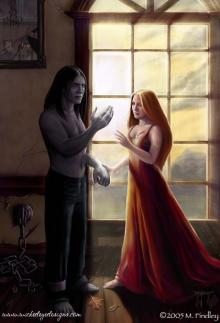 Sunshine
Sunshine Beauty: A Retelling of the Story of Beauty and the Beast
Beauty: A Retelling of the Story of Beauty and the Beast Shadows
Shadows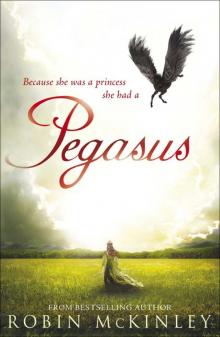 Pegasus
Pegasus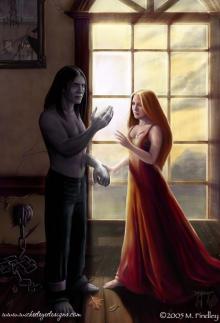 Chalice
Chalice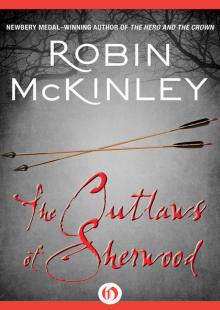 The Outlaws of Sherwood
The Outlaws of Sherwood Fire: Tales of Elemental Spirits
Fire: Tales of Elemental Spirits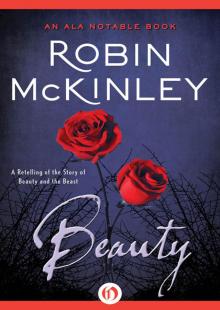 Beauty
Beauty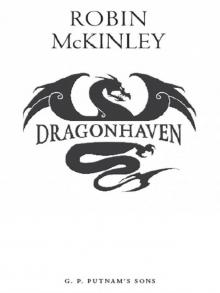 Dragon Haven
Dragon Haven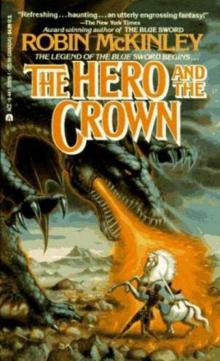 The Hero And The Crown d-2
The Hero And The Crown d-2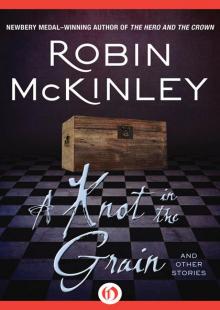 A Knot in the Grain
A Knot in the Grain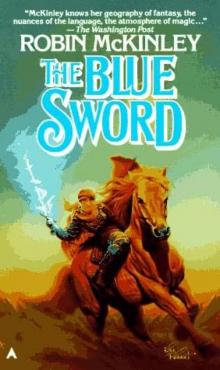 The Blue Sword d-1
The Blue Sword d-1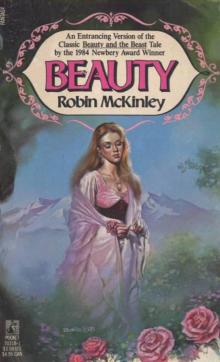 Beauty (v1.2)
Beauty (v1.2)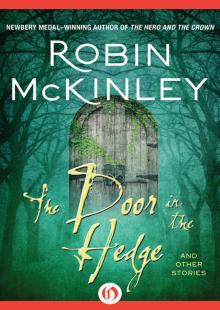 The Door in the Hedge
The Door in the Hedge